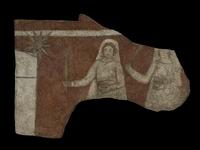
“There I will give thee my love” (Song 7:12): The History of Byzantine Nuptial Bedchamber Rites
Part of the ISM Fellows lunch series
Prior to the standardization of the Orthodox Christian rite of marriage in the sixteenth century, Byzantine liturgical manuscripts attest to a plethora of local nuptial rites that were once used by Christians throughout the Eastern Mediterranean world. While these nuptial rites can be quite different from one another, common threads can be discerned. One of these concerns the priestly blessing of the nuptial bedchamber, a liturgical rite attested in Byzantine sources from Palestine, Egypt, Southern Italy and the Balkan Peninsula. In fact, it appears that in some regions, ecclesial blessings of the nuptial bedchamber predate the formal Byzantine church rite of marriage as formulated in Constantinople by the sixth century.
This presentation will explore the origins and history of Byzantine nuptial bedchamber blessings, together with the notions of sexuality that these prayers imply. It will also trace the perdurance of these ancient rites within later Byzantine sources and the recontextualization of bedchamber prayers. It will demonstrate that, contrary to contemporary understanding, some prayers within the present-day Orthodox rite of marriage had their origin in the inauguration of a couple’s sexual relationship.
Gabriel Radle received his doctorate in Byzantine liturgiology at the Pontifical Oriental Institute in Rome. His dissertation was a study of marriage in the Byzantine tradition, based upon an analysis of the earliest extant Greek manuscript sources of nuptial rites (8th-13th c.). It represents the first comprehensive historical study of a sacrament in the Byzantine tradition. He has published many articles on Byzantine liturgical history and has edited a number of early Greek liturgical sources, including some of the first millennium codex fragments of the “Sinai New Finds” collection. As a postdoctoral associate of the Yale Institute of Sacred Music, he is currently preparing a monograph on marriage in Byzantium.